Diary of Trooper Ion Llewellyn Idriess-Aug 1916-Part 3
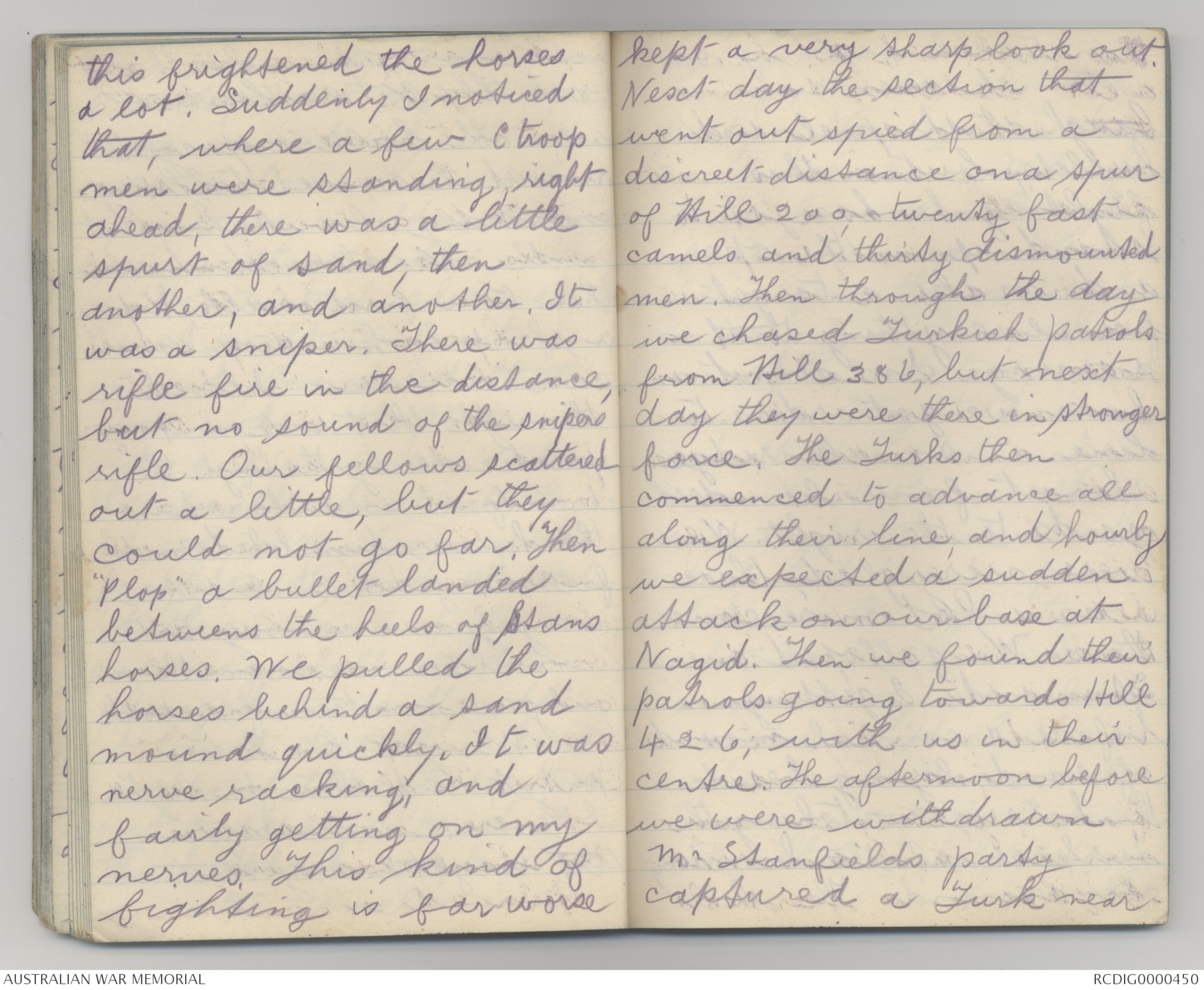
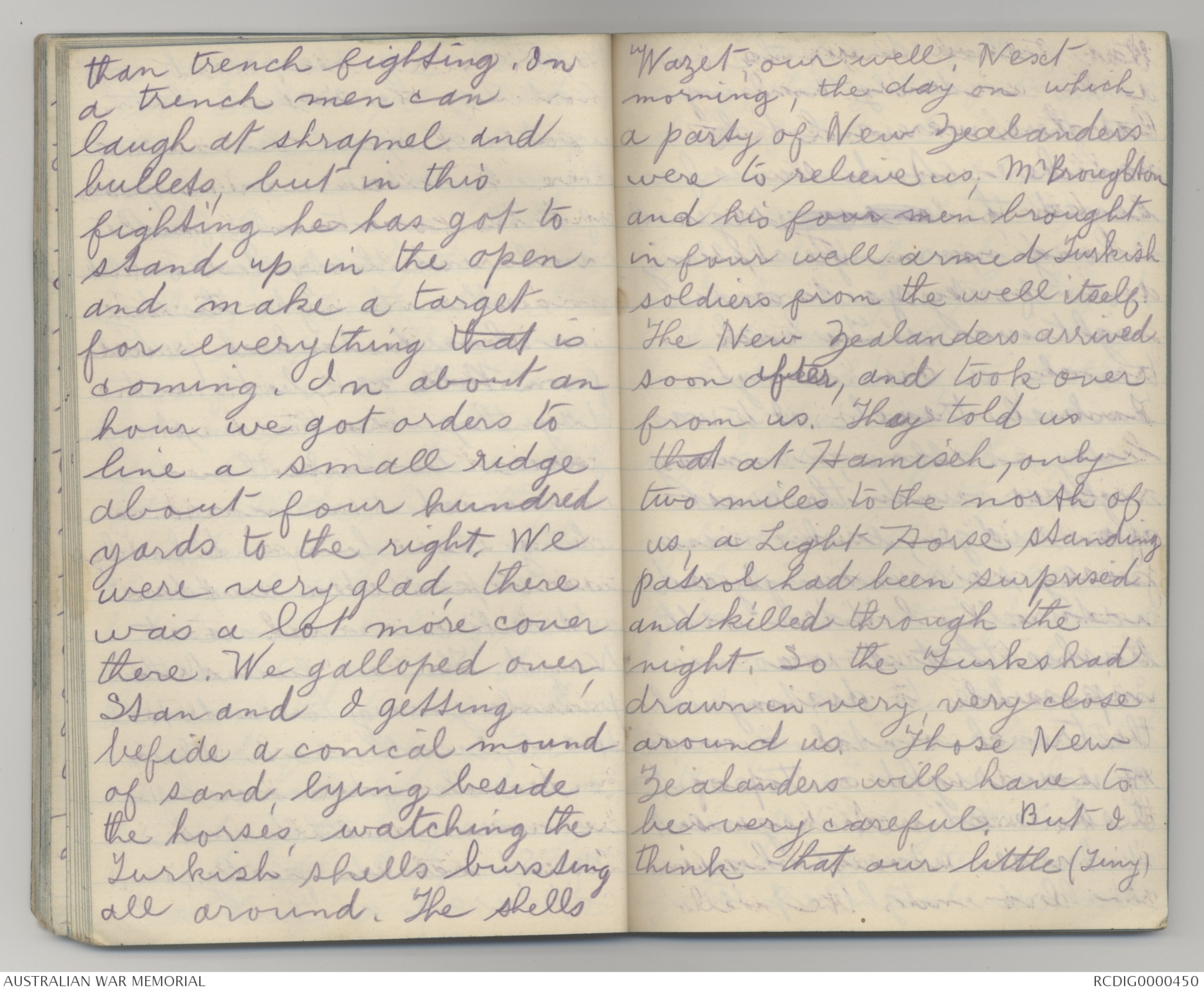
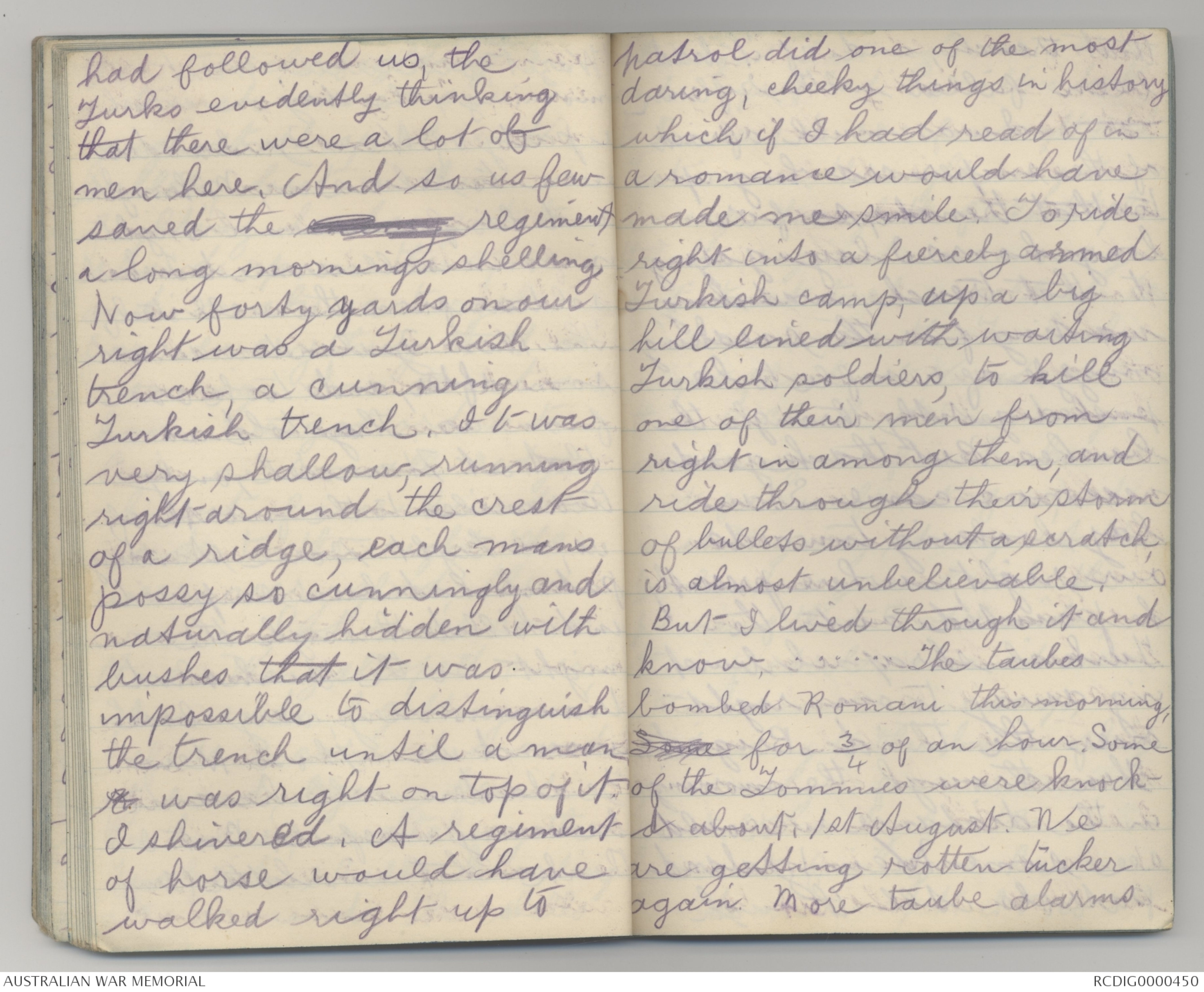
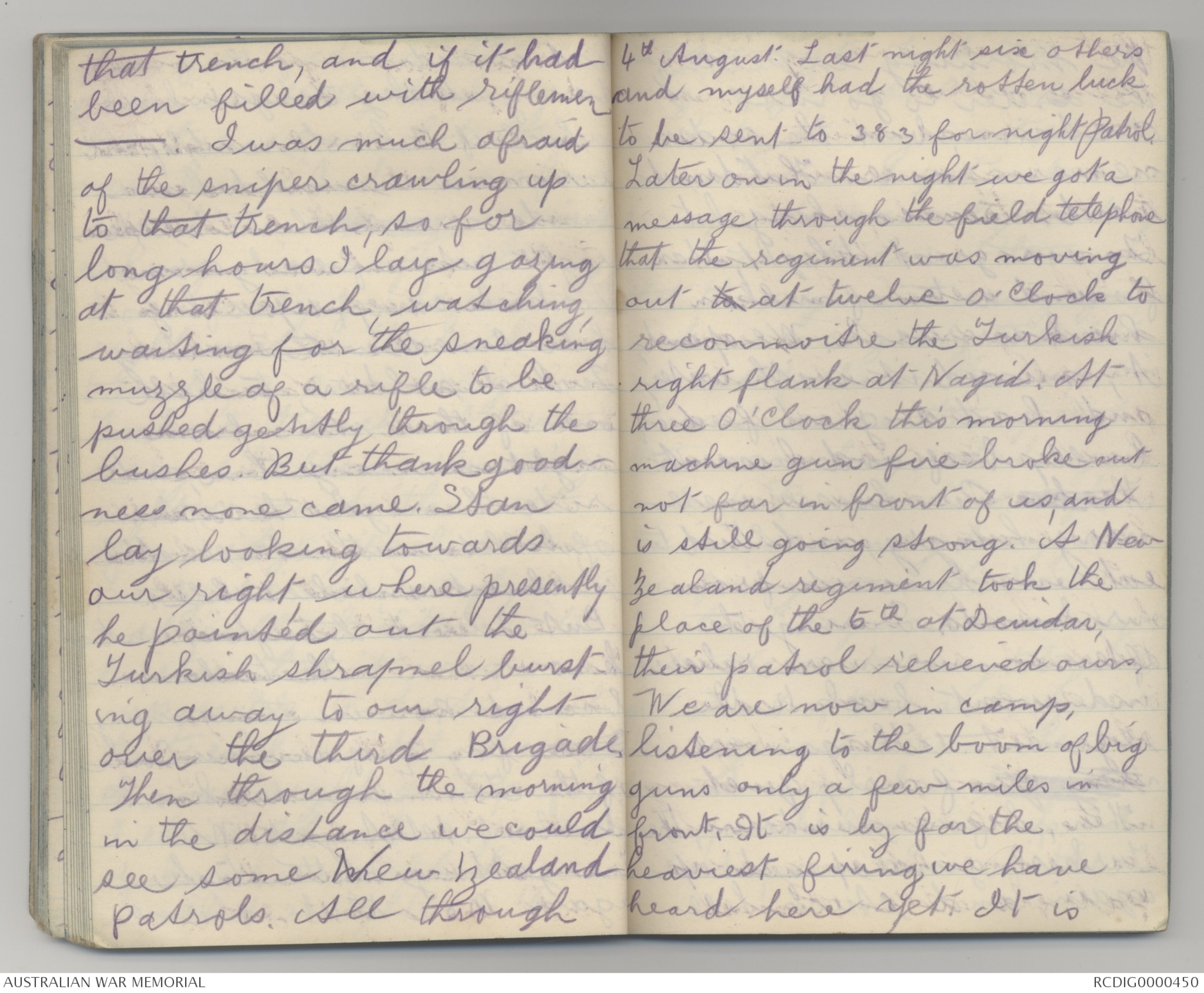
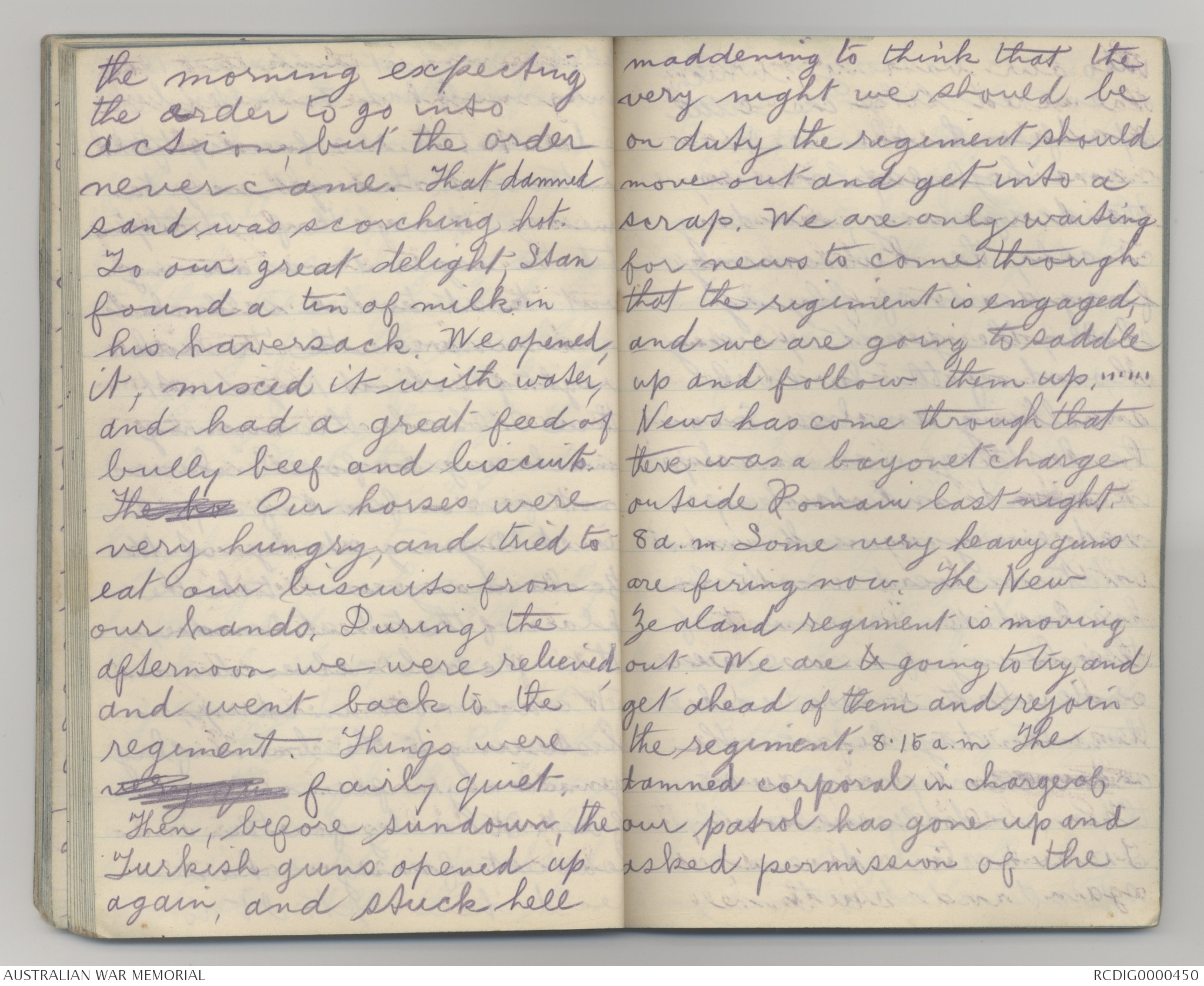
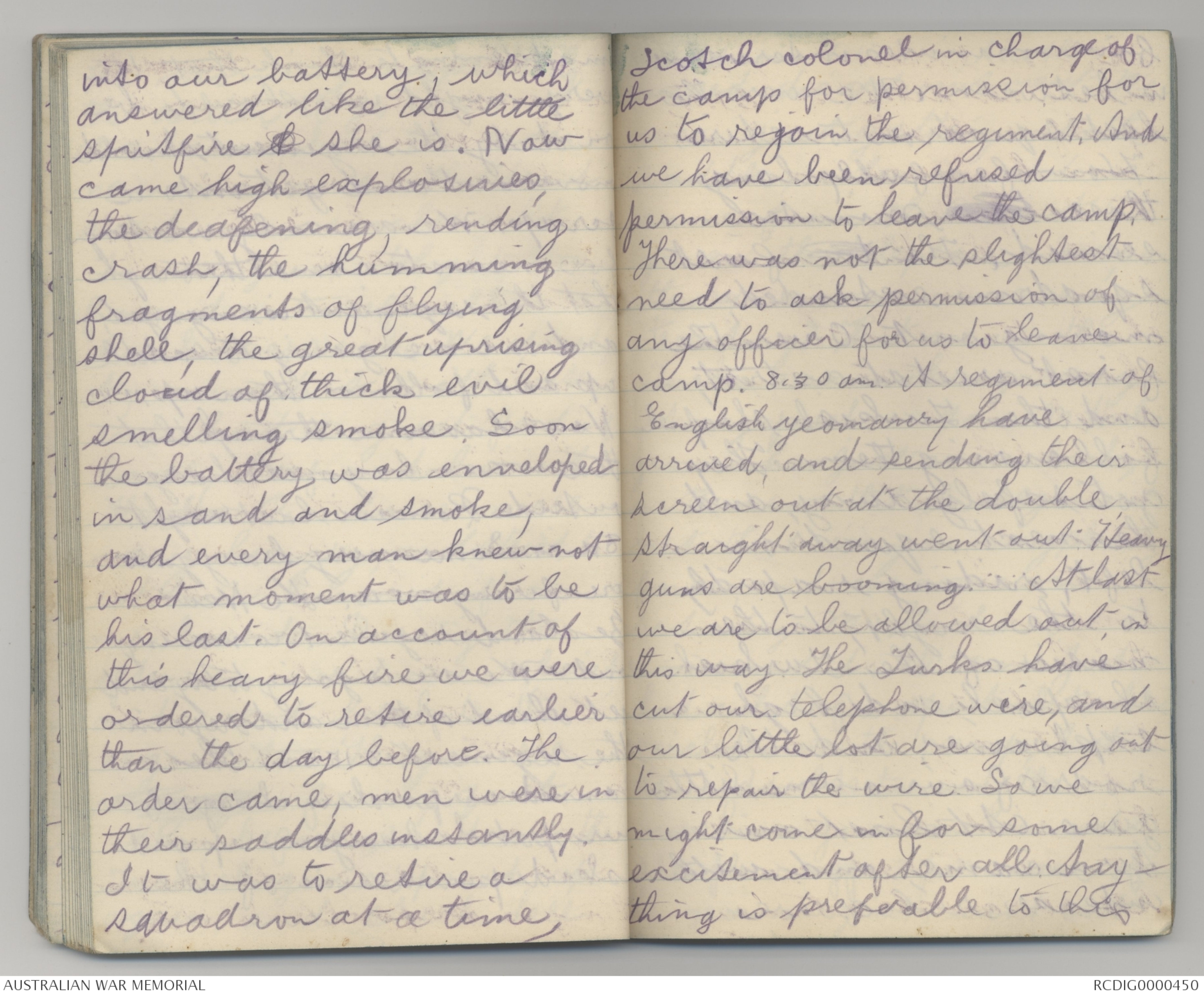
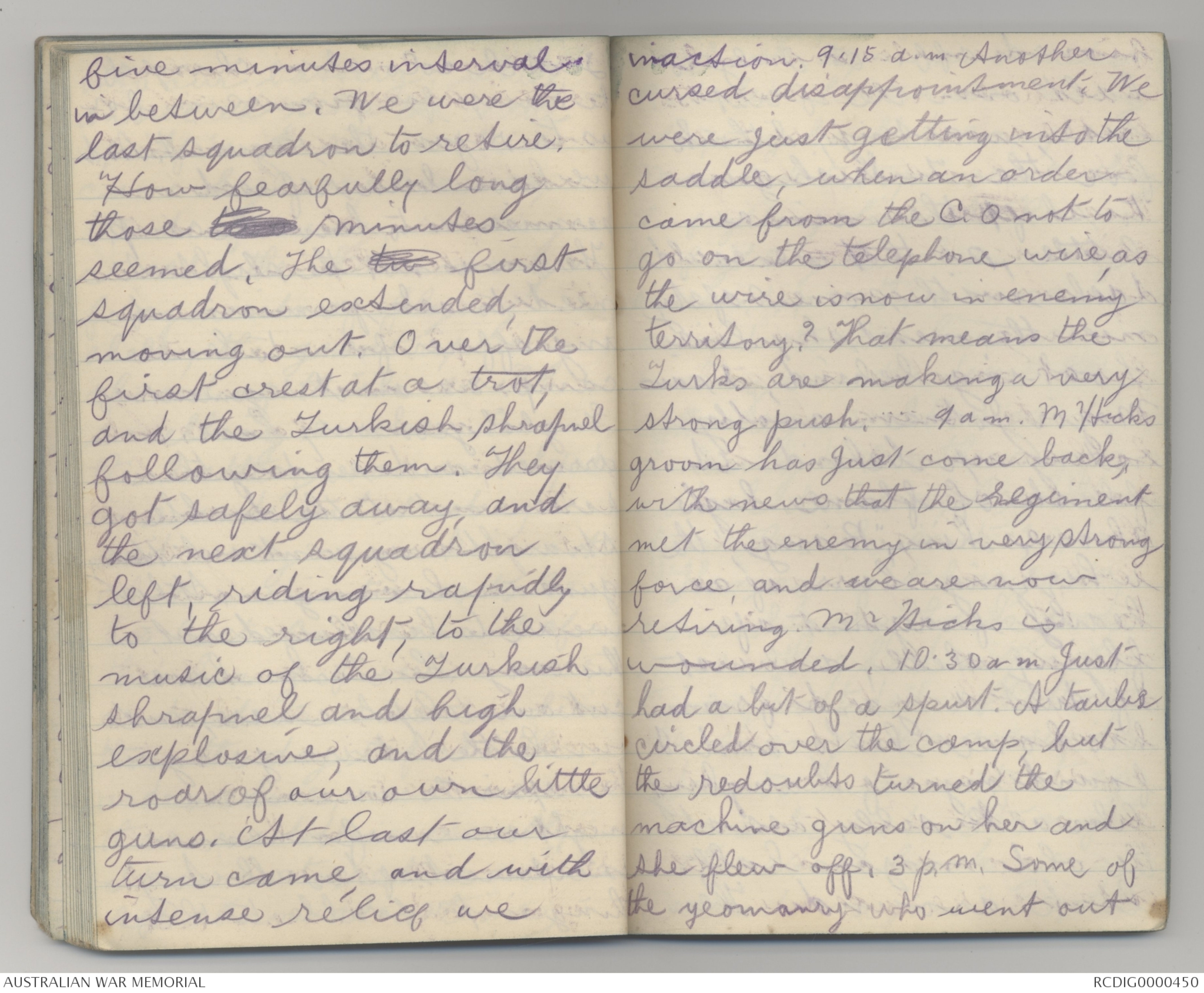
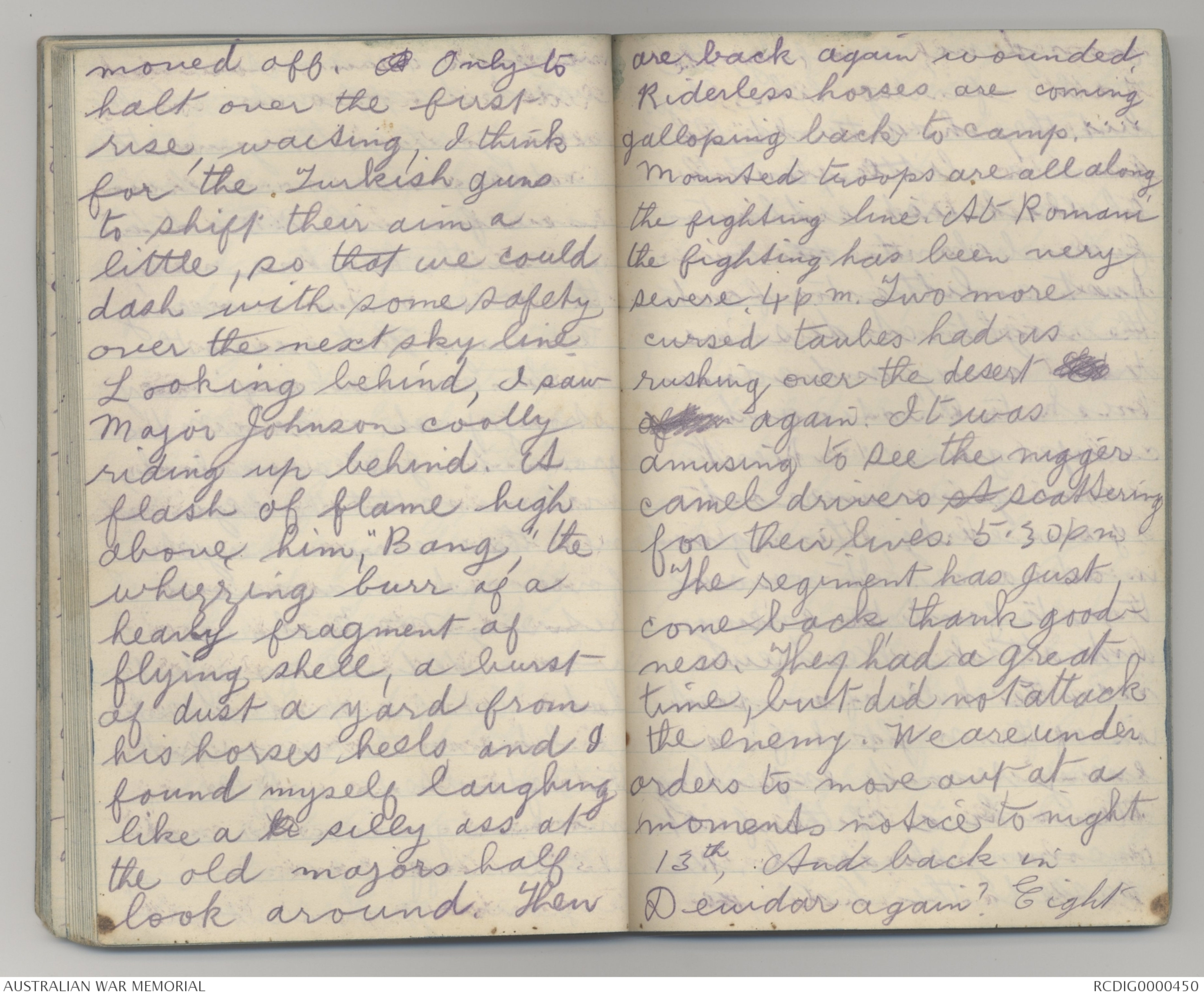
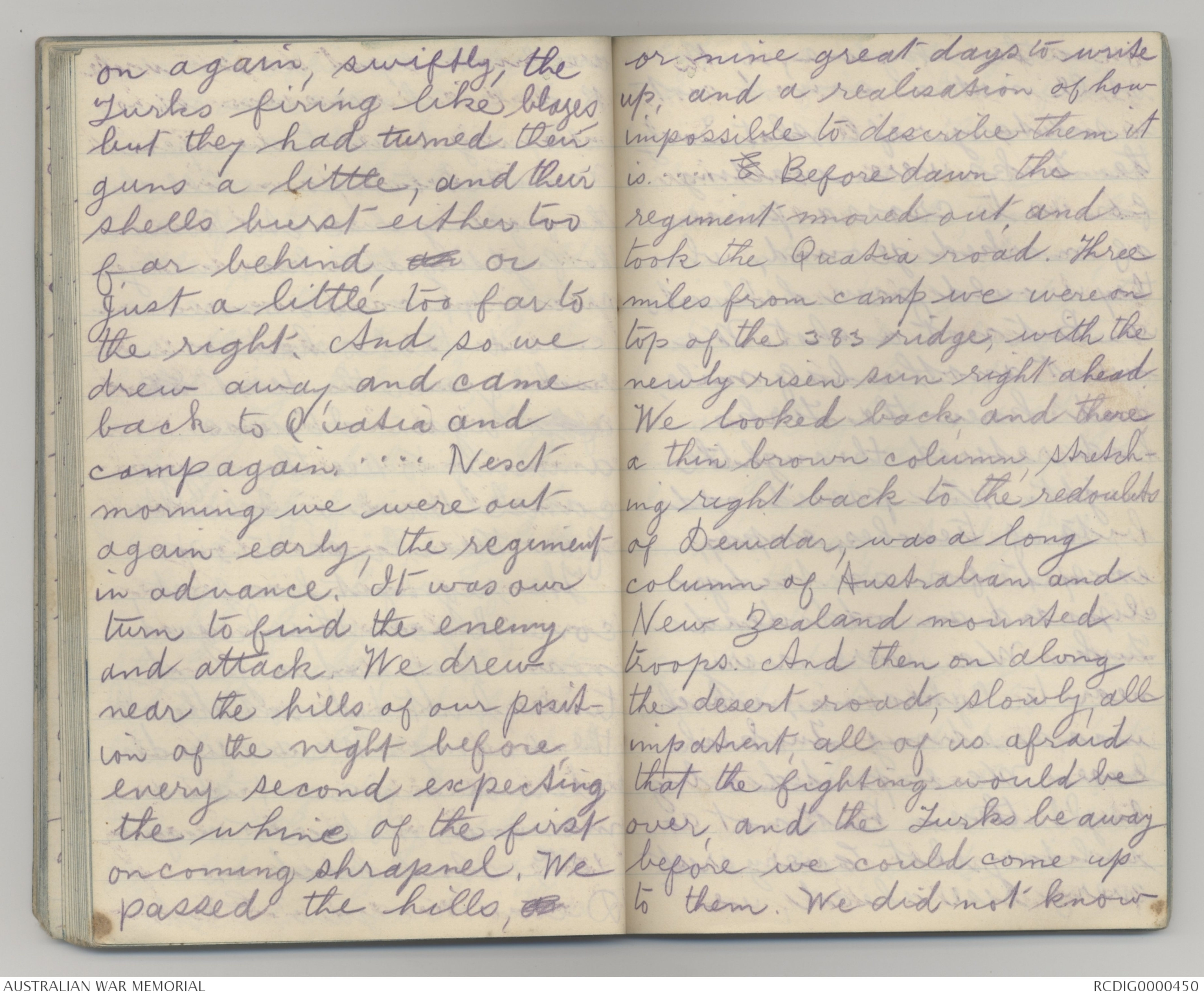
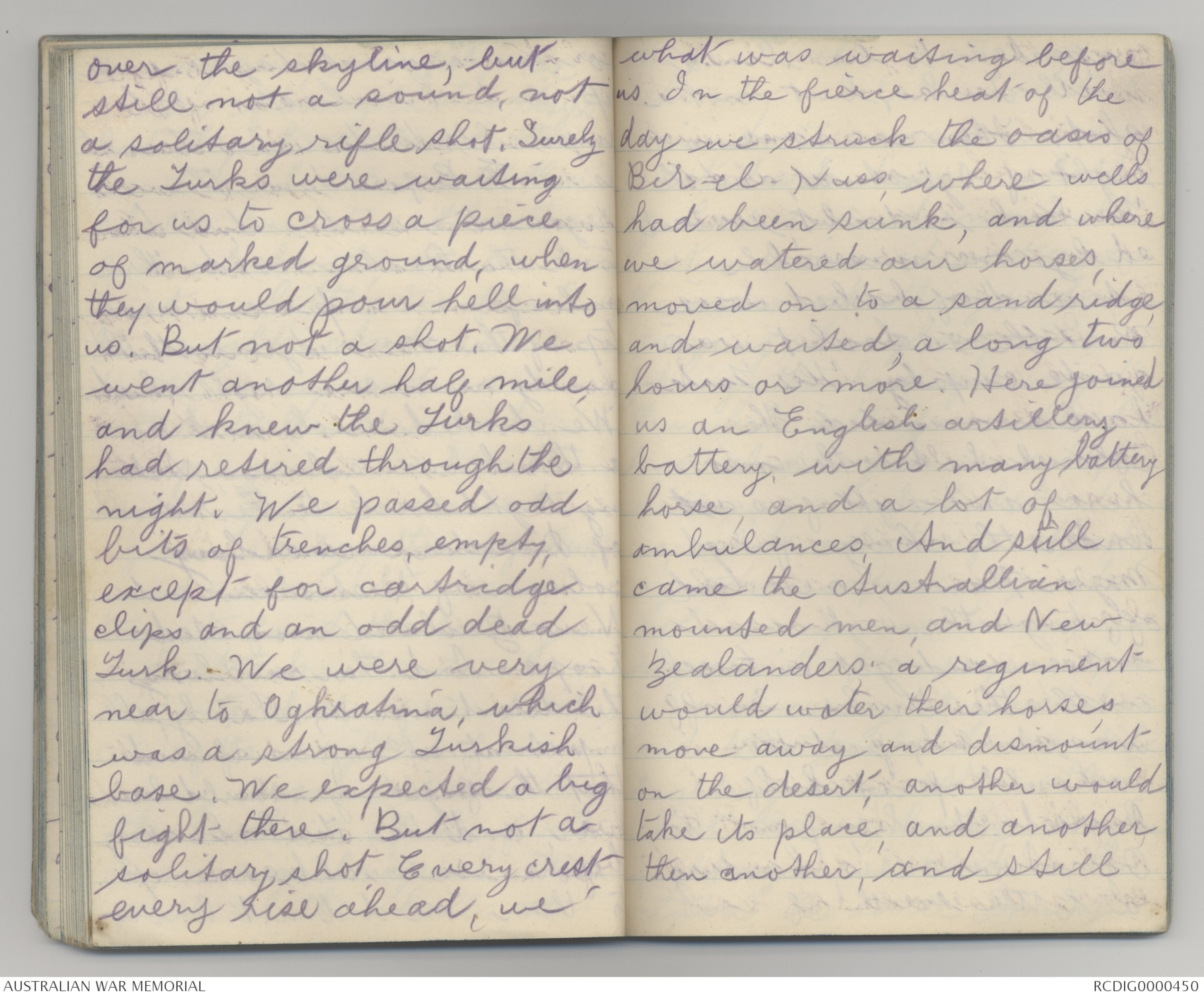
this frightened the horses
a lot. Suddenly I noticed
that, where a few C troop
men were standing, right
ahead, there was a little
spurt of sand, then
another, and another. It
was a sniper. There was
rifle fire in the distance,
but no sound of the snipers
rifle. Our fellows scattered
out a little, but they
could not go far. Then
"Plop" a bullet landed
between the heels of Stans
horses. We pulled the
horses behind a sand
mound quickly. It was
nerve racking, and
fairly getting on my
nerves. This kind of
fighting is far worse
kept a very sharp look out.
Next day the section that
went out spied from a
discreet distance on a spur
of Hill 200, twenty fast
camels and thirty dismounted
men. Then through the day
we chased Turkish patrols
from Hill 386, but next
day they were there in stronger
force. The Turks then
commenced to advance all
along their line, and hourly
we expected a sudden
attack on our base at
Nagid. Then we found their
patrols going towards Hill
426, with us in their
centre. The afternoon before
we were withdrawn
Mr Stanfields party
captured a Turk near
than trench fighting. In
a trench men can
laugh at shrapnel and
bullets, but in this
fighting he has got to
stand up in the open
and make a target
for everything that is
coming. In about an
hour we got orders to
line a small ridge
about four hundred
yards to the right. We
were very glad, there
was a lot more cover
there. We galloped over,
Stan & I getting
befide a conical mound
of sand, lying beside
the horses, watching the
Turkish shells bursting
all around. The shells
Wazet, our well. Next
morning, the day on which
a party of New Zealanders
were to relieve us, Mr Broughton
and his four men brought
in four well armed Turkish
soldiers from the well itself.
The New Zealanders arrived
soon after, and took over
from us. They told us
that at Hamiseh, only
two miles to the north of
us, a Light Horse standing
patrol had been surprised
and killed through the
night. So the Turks had
drawn in very, very close
around us. Those New
Zealanders will have to
be very careful. But I
think that our little (Tiny)
had followed us, the
Turks evidently thinking
that there were a lot of
men here. And so us few
saved the army regiment
a long mornings shelling.
Now forty yards on our
right was a Turkish
trench, a cunning
Turkish trench. It was
very shallow, running
right around the crest
of a ridge, each mans
possy so cunningly and
naturally hidden with
bushes that it was
impossible to distinguish
the trench until a man
to was right on top of it.
I shivered. A regiment
of horse would have
walked right up
patrol did one of the most
daring, cheeky things in history
which if I had read of in
a romance would have
made me smile. To ride
right into a fiercely armed
Turkish camp, up a big
hill lined with waiting
Turkish soldiers, to kill
one of their men from
right in among them, and
ride through their storm
of bullets without a scratch,
is almost unbelievable.
But I lived through it and
know, . . . . . The taubes
bombed Romani this morning,
Some for ¾ of an hour. Some
of the Tommies were knocked
about. 1st August. We
are getting rotten tucker
again. More taube alarms.
that trench, and if it had
been filled with riflemen
— . I was much afraid
of the sniper crawling up
to that trench, so for
long hours I lay gazing
at that trench, watching,
waiting for the sneaking
muzzle of a rifle to be
pushed gently through the
bushes. But thank goodness
none came. Stan
lay looking towards
our right, where presently
he pointed out the
Turkish shrapnel bursting
away to our right
over the third Brigade.
Then through the morning
in the distance we could
see some New Zealand
patrols. All through
4th August. Last night six others
and myself had the rotten luck
to be sent to 383 for night patrol.
Later on in the night we got a
message through the field telephone
that the regiment was moving
out to at twelve O'Clock to
reconnoitre the Turkish
right flank at Nagid. At
three O'Clock this morning
machine gun fire broke out
not far in front of us, and
is still going strong. A New
Zealand regiment took the
place of the 6th at Deuidar,
their patrol relieved ours.
We are now in camp,
listening to the boom of big
guns only a few miles in
front. it is by far the
heaviest firing we have
heard here yet. It is
the morning expecting
the order to go into
action, but the order
never came. That damned
sand was scorching hot.
To our great delight, Stan
found a tin of milk in
his haversack. We opened,
it, mixed it with water,
and had a great feed of
bully beef and biscuits.
The ho Our horses were
very hungry, and tried to
eat our biscuits from
our hands. During the
afternoon we were relieved,
and went back to the
regiment. Things were
very qui fairly quiet.
Then, before sundown, the
Turkish guns opened up
again, and stuck hell
maddening to think that the
very night we should be
on duty the regiment should
move out and get into a
scrap. We are only waiting
for news to come through
that the regiment is engaged,
and we are going to saddle
up and follow them up. .....
News has come through that
there was a bayonet charge
outside Romani last night.
8 a.m. Some very heavy guns
are firing now. The New
Zealand regiment is moving
out. We are b going to try and
get ahead of them and rejoin
the regiment. 8.15 a.m The
damned corporal in charge of
our patrol has gone up and
asked permission of the
into our battery, which
answered like the little
spitfire x she is. Now
came high explosives,
the deafening, rending
crash, the humming
fragments of flying
shell, the great uprising
cloud of thick evil
smelling smoke. Soon
the battery was enveloped
in sand and smoke,
and every man knew not
what moment was to be
his last. On account of
this heavy fire we were
ordered to retire earlier
than the day before. The
order came, men were in
their saddles instantly.
It was to retire a
squadron at a time,
Scotch colonel in charge of
the camp for permission for
us to rejoin the regiment. And
we have been refused
permission to leave the camp.
There was not the slightest
need to ask permission of
any officer for us to leave
camp. 8.30 am. A regiment of
English yeomanry have
arrived, and sending their
screen out at the double,
straight away went out. Heavy
guns are booming. At last
we are to be allowed out, in
this way. The Turks have
cut our telephone wire, and
our little lot are going out
to repair the wire. So we
might come in for some
excitement after all. Anything
is preferable to this
five minute intervals
in between. We were the
last squadron to retire.
How fearfully long
those times minutes
seemed. The tu first
squadron extended,
moving out. Over the
first crest at a trot,
and the Turkish shrapnel
following them. They
got safely away, and
the next squadron
left, riding rapidly
to the right, to the
music of the Turkish
shrapnel and high
explosive, and the
roar of our own little
guns. At last our
turn came, and with
intense relief we
inaction. 9.15 a.m. Another
cursed disappointment. We
were just getting into the
saddle, when an order
came from the C.O. not to
go on the telephone wire, as
the wire is now in enemy
territory? That means the
Turks are making a very
strong push. 9 a.m. Mr Hicks
groom has just come back,
with news that the regiment
met the enemy in very strong
force, and we are now
retiring. Mr Hicks is
wounded. 10.30 am Just
had a bit of a spurt. A taube
circled over the camp, but
the redoubts turned the
machine guns on her and
she flew off. 3 p.m. Some of
the yeomanry who went out
moved off. A Only to
halt over the first
rise, waiting, I think
for the Turkish guns
to shift their aim a
little, so that we could
dash with some safety
over the next sky line.
Looking behind, I saw
Major Johnson coolly
riding up behind. A
flash of flame high
above him, "Bang," the
whirring burr of a
heavy fragment of
flying shell, a burst
of dust a yard from
his horses heels and I
found myself laughing
like a lu silly ass at
the old majors half
look around. Then
are back again wounded.
Riderless horses are coming
galloping back to camp.
Mounted troops are all along
the fighting line. At Romani
the fighting has been very
severe. 4 p.m. Two more
cursed taubes had us
rushing over the desert soo
after again. It was
amusing to see the nigger
camel drivers st scattering
for their lives. 5.30 p.m.
The regiment has just
come back thank goodness.
They had a great
time, but did not attack
the enemy. We are under
orders to move out at a
moments notice to night.
13th, And back in
Deuidar again? Eight
on again, swiftly, the
Turks firing like blazes
but they had turned their
guns a little, and their
shells burst either too
far behind, on or
just a little too far to
the right. And so we
drew away, and came
back to Q'uatia and
camp again. . . . . Next
morning we were out
again early, the regiment
in advance. It was our
turn to find the enemy
and attack. We drew
near the hills of our position
of the night before,
every second expecting
the whine of the first
oncoming shrapnel. We
passed the hills, as
or nine great days to write
up, and a realisation of how
impossible to describe them it
is. . . . . T Before dawn the
regiment moved out, and
took the Quatia road. Three
miles from camp we were on
top of the 383 ridge, with the
newly risen sun right ahead.
We looked back, and there
a thin brown column, stretching
right back to the redoubts
of Deuidar, was a long
column of Australian and
New Zealand mounted
troops. And then on along
the desert road, slowly, all
impatient, all of us afraid
that the fighting would be
over, and the Turks be away
before we could come up
to them. We did not know
over the skyline, but
still not a sound, not
a solitary rifle shot. Surely
the Turks were waiting
for us to cross a piece
of marked ground, when
they would pour hell into
us. But not a shot. We
went another half mile,
and knew the Turks
had retired through the
night. We passed odd
bits of trenches, empty,
except for cartridge
clips and an odd dead
Turk. We were very
near to Oghratina which
was a strong Turkish
base. We expected a big
fight there. But not a
solitary shot. Every crest,
every rise ahead, we
what was waiting before
us. In the fierce heat of the
day we struck the oasis of
Bir el Nuss, where wells
had been sunk, and where
we watered our horses,
moved on to a sand ridge,
and waited, a long two
hours or more. Here joined
us an English artillery
battery, with many battery
horse, and a lot of
ambulances. And still
came the Australlian
mounted men, and New
Zealanders, a regiment
would water their horses,
move away and dismount
on the desert, another would
take its place, and another
then another, and still
 Diane Ware
Diane WareThis transcription item is now locked to you for editing. To release the lock either Save your changes or Cancel.
This lock will be automatically released after 60 minutes of inactivity.